More about the serial murder investigation
| Hankyoreh has a long and interesting article on the serial murder case, detailing the sorry state of the murder investigation. • Police published Yu's words almost as such without thoroughly investigating the matter, so that the number of killed people went back and forth. "Police relied only on Yu's confession, and media followed and danced to his every word." • 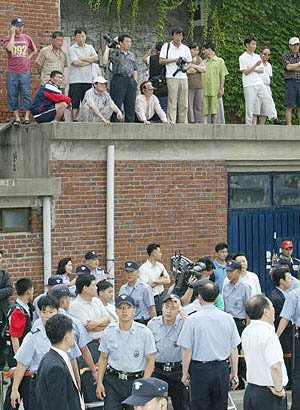 Investigation in the crime scene was a total kaep'an, the police were not able to hold back the hordes of reporters. The dummy playing the role of the victim got broke. (The photograph on the right linked from Hankyoreh is from the crime scene investigation.) Investigation in the crime scene was a total kaep'an, the police were not able to hold back the hordes of reporters. The dummy playing the role of the victim got broke. (The photograph on the right linked from Hankyoreh is from the crime scene investigation.)The article notes that the "crime scene investigation" was nothing but a show: when the police announced that Yu (or Yoo) had murder 21 people, all material evidence they could present was one hammer. • When the police announced that Yu had purchased a knife from the Dongdaemun area in September 2003, they went to do the crime scene investigation to the Dongdaemun Stadium second hand market, which was opened in early 2004. (That was when the second-hand vendors from the Hwanghak-dong market were relocated to the stadium because of the Cheonggyecheon construction.) • Yu's small apartment, which is likely to have been the crime scene of 10 murders, was opened for the media for two hours. Just about everyone could come and go. Reporters checked Yu's cabins and drawers, someone opened his computer and went through some files. • One person that Yu had planned to kill was a former cabinet minister; fortunately for him and his family, someone was working in the garden of the house, so Yu chose another wealthy looking house and went there to commit a murder. • The reason why Yu chose to commit murders close to churches was, according to his own admission, his resentment for an earlier burglary conviction. He said he had prayed for lenience in front of a small cross, but still got 10 months, so he wanted to show that it's no use believing in Jesus by committing murders close to churches. • The article says that Hankyoreh at that time pondered (article from November 2003) the possibility of a serial murderer, but police chose to investigate the cases separately. • There's possibility that the grieving woman's charge towards the suspect Yu, after which a police officer kicked her down, was planned in advance. The bereaved family member was escorted in a car of a Japanese TV station, which belongs to the company publishing a "far-rightist newspaper with an often contemptful (kyôngmyôljôk) attitude towards Korea." (Let me guess this is Sankei Shinbun.) Categories at del.icio.us/hunjang: Koreansociety |



 Kim Seung-ok's collection of short stories
Kim Seung-ok's collection of short stories 
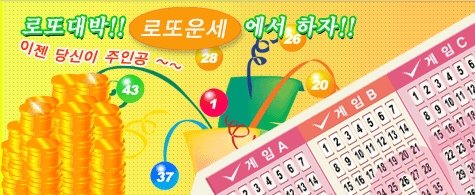
 For the proper law terminology in the case, see the
For the proper law terminology in the case, see the 











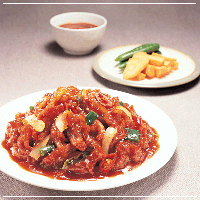 Anyway,
Anyway, 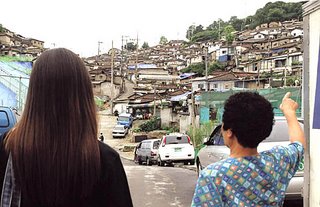
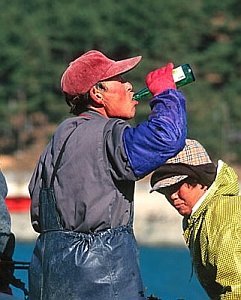


 haircut for 3000 won to 100 000 W perms. The hair needs to be cut the bigger the price. Getting hair washed costs extra as well as drying. Now that's Westernization! That sounds like taking money for another filling of side dish at a meal.
haircut for 3000 won to 100 000 W perms. The hair needs to be cut the bigger the price. Getting hair washed costs extra as well as drying. Now that's Westernization! That sounds like taking money for another filling of side dish at a meal. 




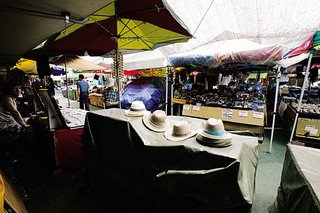
 I didn't think I would find much linkable from "
I didn't think I would find much linkable from "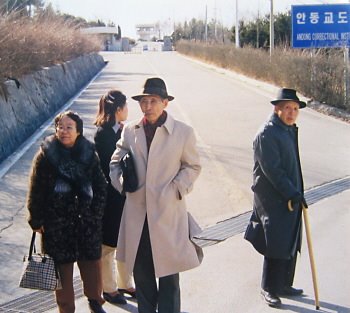 And now for my own thing. The picture is taken in front of Andong prison in late January 1999 when I accompanied a newspaper reporter, two South Koreans and two former North Korean spies (the old men in the pic), as these four went to see the person in prison on which the reporter was making a story.
And now for my own thing. The picture is taken in front of Andong prison in late January 1999 when I accompanied a newspaper reporter, two South Koreans and two former North Korean spies (the old men in the pic), as these four went to see the person in prison on which the reporter was making a story.